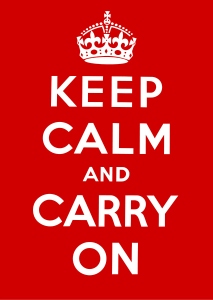
8 Ways to Go from KCCO to “Scary” Composure
Man, how many of you are growing tired of this phrase?
“Keep Calm and Carry On” has been burned into every corner of our culture. It’s almost like you can put a crown on top of a bunch of “Memmy memmy meme meme and memme memme” words and it makes a “funny.” If there’s any reason why this phrase has been plastered from seas to shining sea, I think it’s because, bottom-line, we all just need to chill out a little more. Underneath the surface, I like where this phrase is headed, BUT IT JUST SOUNDS SO SOFT!
Keeping composure during the storms that pass through our lives is extremely difficult. It takes a lot of energy to maintain your cool during an argument with your girlfriend, your boss, or your coach. For me, it’s nearly impossible to remain calm during a tough round of golf. It takes the power of God to turn my face and walk away from that dude talking noise on the basketball court.
But here’s the good news. You can control your composure. It’s a trait that you can improve, just like you can improve your golf swing. Most importantly, it’s also a trait that, if improved, people will begin to gravitate towards you. You’ll waste less of your body’s energy, and you’ll begin to perform at a much higher level….in all the areas of your life. Your unwillingness to give into the stress, and the noise, will SCARE your competitors. Your resilience and level-headedness will show those around you that you refuse to back down. There’s nothing “soft” about relentless composure.
1) One Deep Breath– So many times, we forget to do what our body wants most. When we are under stress, our blood pressure increases, right along with our breathing and heart rate. First, before all else, take one…deep…breath. Deep breathing sends a message to our brains to slow down and relax. You can kick the “fight or flight” response that your body is programmed with, by taking ONE deep breath. This will bring your nervous system back to balance. It’s the easiest thing you can do. You can do it on the free throw line, on the bench press, or in your boss’s office. Faith Hill said so, too.
2) Speak Easy– Our tone and delivery directly reflect our composure. When you’re in a high pressure situation, and the bullets are flying, focus on your words. Speak slowly. Speak clearly. Speak confidently. Listen to Peyton Manning run through his cadence the next time he’s on TV. You can clearly here everything (cities, colors, numbers, etc.). The confidence he exudes in his huddle, and under-center, terrifies defenses.
3) Understand the Cost of Giving in– Watching Tiger Woods play golf right now is almost painful. He’s always been an emotionally aggressive player, but recently I think he beats himself up over his poor play. It’s his biggest roadblock right now, and it’s brutally obvious. When I watch Phil Mickelson, I wonder, “how in the hell does this dork win major championships.” Part of me can’t stand the guy, but his positive mental self-talk is unwavering. Mentally, he WILL NOT give in to negative self-talk, even if he has to momentarily fake it. This can be extremely exhausting for his competitors that want nothing more than to see him break.
4) Walk Hard– Your physical appearance sets the tone for how others perceive you. Keep your chin pointed upwards. Put your shoulder blades back and stick your chest out. Slow down your movements, and breathe deeply. Be quick, but don’t hurry. Turn your body away from anyone that’s trying to break you, and walk away from them.
Mike Trout walks like he’s going somewhere
5) Sit on Your Social Media– Sometimes I think good-willed people make complete asses out of themselves on social media. Right now, So much of our image is tied to social media. We’re constantly one click away from letting the whole world know that we’ve lost composure, that we are an opinionated prick, or that our professional life doesn’t match our personal life. It doesn’t take much to show people that you’re weak. We are all emotional beings. Stay positive on your social networks, and quit complaining. Let a tweet or status update sit in your drafts for five minutes before you post it. Venting about how much you hate Mondays on Facebook might make you feel relieved for 5-10 seconds, but the truth is, nobody really cares. If so much of your personal image is portrayed on social networks, use it to show others that you are strong.
6) Temper your Success– Composure during times of success is equally important to your composure in times of struggle. If you’re putting in maximum effort, success shouldn’t come as a surprise to you. It should be expected. This doesn’t mean you need to react to success with the stoicism of Nick Saban (by the way, this guy LOVES Oatmeal Cream Pies). Remember the way it feels, thank those that helped you get there, and act like you’re used to it by now.
7) Be Composed When No One is Around– Be consistent with your composure. Practice your ability to remain composed, even when no one is watching you. This is extremely powerful. Bring composure into your awareness. Before you call it a day, reflect on how composed you were. Ask yourself how your composure (something you can control) made your day more positive, or how your lack of composure got in the way of your success.
8) Smile– I know what you’re thinking. Smiling is soft. No it’s not! Smiling is strong. Smiling lets those around you know that you have a firm stranglehold on negativity. It proves that you refuse to let a hostile environment break you. When you can look a difficult circumstance square in the face, smile, and show others that you’re enjoying yourself…that’s scary. Ken Griffey Jr would, and you should, too.




